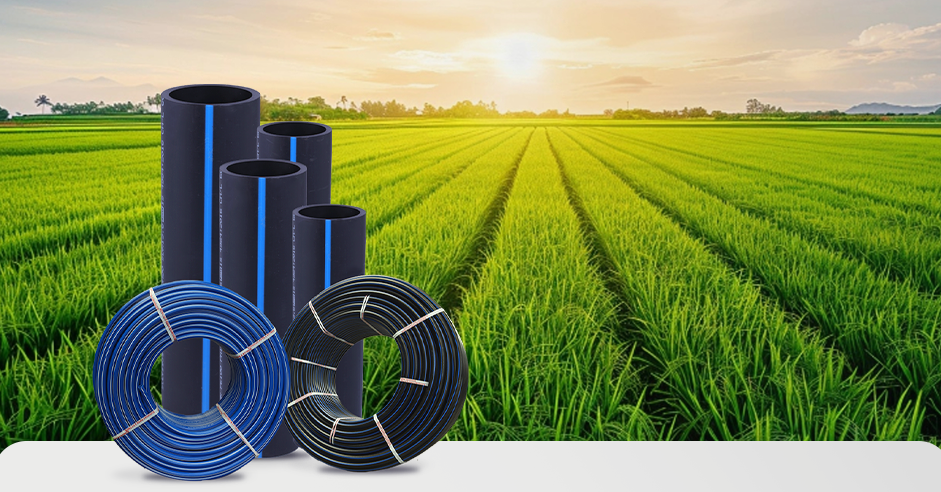Exploring American Plastics HDPE Pipe Manufacturing and Its Role in Modern Infrastructure
Wiki Article
Recognizing the Trick Benefits of HDPE Pipe for Water and Wastewater Management
Making use of HDPE pipe in water and wastewater administration provides countless benefits that warrant consideration. Its phenomenal sturdiness and lengthy life-span make it a preferred option for numerous tasks. In addition, the material's resistance to deterioration and chemical damages boosts its dependability in various settings. Nevertheless, the benefits expand beyond simply long life and resistance. Exploring its cost-effectiveness and ecological effect exposes much more engaging reasons for its widespread adoption in modern infrastructureRemarkable Durability and Long Life

HDPE pipe stands out for its phenomenal longevity and durability, making it a preferred selection in water administration systems. Constructed from high-density polyethylene, these pipes can hold up against considerable pressure and tension, making certain reputable efficiency over time. Their durable nature permits them to endure extreme environmental conditions, including temperature level changes and soil movements, which can cause other materials to fail.
The lifespan of HDPE pipelines frequently surpasses 50 years, offering a cost-efficient solution for districts and sectors alike. In addition, the material's lightweight properties simplify installation, minimizing labor costs and timeframes. This toughness decreases the requirement for constant repair services or replacements, better enhancing its financial appeal.
In water administration applications, the dependability of HDPE pipelines means less disruptions and improved service continuity, making them indispensable to sustainable infrastructure growth. The combination of sturdiness and durability solidifies HDPE's duty as a keystone in reliable water management solutions.

Resistance to Corrosion and Chemical Damage
While several materials succumb to rust and chemical damage in time, HDPE pipes show exceptional resistance, making them perfect for numerous water administration applications. This resilience stems from the molecular framework of high-density polyethylene, which is inherently non-reactive and does not wear away like metals or weaken from direct exposure to rough chemicals. As an outcome, HDPE is extremely effective in environments with aggressive substances, such as wastewater systems that may include acids, bases, and natural solvents.
In addition, HDPE pipes can withstand environmental variables such as dirt acidity and saline problems, even more enhancing their viability for varied applications (Midland TX HDPE Pipe Fittings in Stock). Their capability to keep structural honesty in time minimizes the risk of leakages and failings, which is critical in guaranteeing the safety and dependability of water distribution and wastewater administration systems. Consequently, the resistance to deterioration and chemical damages considerably contributes to the overall performance and long life of HDPE piping options
Cost-Effectiveness and Economic Benefits
When taking into consideration the monetary implications of water monitoring systems, the cost-effectiveness of HDPE pipes ends up being apparent. These pipelines use lower installment and maintenance costs contrasted to conventional products like steel or concrete. Their lightweight nature streamlines transportation and installation, resulting in reduced labor expenses. Additionally, HDPE pipes exhibit a lengthy lifespan, usually exceeding half a century, which translates to less substitutes and long-term cost savings.The residential sewer line repair resistance of HDPE to deterioration and chemical damages minimizes the need for costly repair work and replacements. The pipelines additionally support efficient water circulation, minimizing power costs related to pumping systems. By mitigating leakages and water loss, HDPE pipes contribute to significant economic benefits for municipalities and sectors alike. On the whole, the preliminary investment in HDPE piping can generate considerable financial returns over the lifespan of the water management system, making it a sensible option for lasting infrastructure development.
Ecological Sustainability and Minimized Influence

Convenience and Flexibility in Installation
Due to their unique residential or commercial properties, HDPE pipelines use amazing adaptability and adaptability in installation, making them suitable for a vast array of applications. Their lightweight nature permits simpler handling and transport, minimizing labor costs and installation time. HDPE pipelines can be curved and shaped to fit different surfaces and task demands, which is particularly useful in testing settings.In addition, their resistance to rust and chemical damages allows for installation in varied settings without the need for specialized safety coverings. The ability to fuse joints creates a continual, leak-free system, improving the overall integrity and integrity of the installment. HDPE's versatility also suits ground movement, lowering the threat of damage in locations susceptible to shifting dirt. In general, these characteristics make HDPE pipelines not only versatile yet read this also a recommended choice for water and wastewater administration systems.
Frequently Asked Concerns
Just How Does HDPE Pipe Contrast to PVC in Water Management Applications?
HDPE pipeline supplies superior versatility, resistance to deterioration, and sturdiness compared to PVC. Its lighter weight assists in less complicated installation, while its lengthy life-span decreases replacement prices, making HDPE a preferred option in water management applications.What Is the Life Expectancy of HDPE Pipes Under Typical Conditions?
Under normal problems, HDPE pipelines can have a life-span varying from 50 to 100 years. Their durability and resistance to deterioration add to their long-lasting performance in various applications, making them a reputable option for infrastructure.Are HDPE Pipes Recyclable After Their Service Life?
Yes, HDPE pipelines are recyclable after their solution life. hdpe pipe in stock Midland TX. They can be processed and repurposed right into new items, substantially minimizing environmental impact and advertising sustainability within the industry, making them an environmentally friendly selection for piping optionsWhat Is the Setup Process for HDPE Piping?
The setup process for HDPE pipelines includes site prep work, trenching, pipeline fusion or mechanical joining, backfilling, and stress testing. Correct methods guarantee a sturdy and reliable system for transporting water and wastewater effectively.Can HDPE Pipes Be Used for Both Drinkable and Non-Potable Water Equipments?
Yes, HDPE pipelines can be used for both potable and non-potable water systems. Their flexibility, durability, and resistance to corrosion make them ideal for different applications, guaranteeing risk-free and efficient transportation of water in various contexts.Report this wiki page